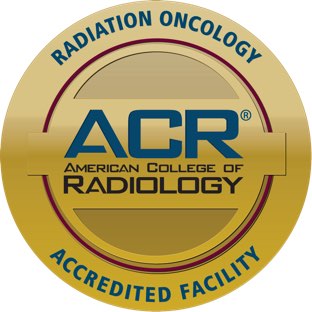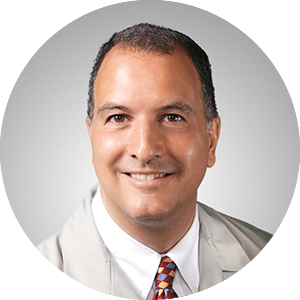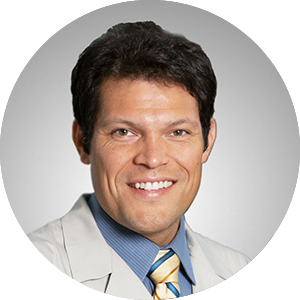It’s your
don’t
procrastinate
It’s Your Prostate. Don’t Procrastinate.
From prevention to recovery, get the comprehensive prostate cancer care you need—close to home.
How well do you know your risk of being diagnosed with prostate cancer?
Prostate cancer is one of the most common types of cancer in men. About one in nine will be diagnosed during their lifetime. The following factors may increase the risk of prostate cancer:
- 65 or older
- Family history of prostate or breast cancer
- African American or Caribbean of African descent
- Inactive lifestyle
- Body mass index (BMI) of 30 or above
- Diet high in processed meat or dairy
Until advanced stages, prostate cancer doesn’t often have any obvious symptoms besides an enlarged prostate—that’s why it’s recommended to get regular screenings for the disease. Additional symptoms may include:
- Frequent urination, especially at night
- Inability to urinate
- Trouble starting or stopping the flow of urine
- Pain or burning when urinating
- Blood in urine or semen
- Inability to have and maintain an erection
- Frequent pain in lower back, hips or upper thighs
Men over 40 should discuss with their healthcare provider how often they should get DRE and PSA tests. Additional tests may also be performed.
PSA test
Involves a simple blood test that can help determine your risk
DRE test
Requires a physical examination of your prostate
Ultrasound
Creates a video image of the prostate using sound waves
Computed tomography (CT) scan
Uses X-rays to produce an image of the prostate
Bone scan
Tests to see if prostate cancer has spread to the bones
Biopsy of the prostate
Removes a small section of tissue for testing
At NCH, we’re committed to providing the latest advanced technology, which offers greater precision, less pain and quicker recovery times. Our advanced treatment options include:
Da Vinci® robotic surgical system
Using advanced robotic arms and 3D imaging, urologists can perform highly complex prostate cancer surgeries through incisions as small as a few centimeters.
Halcyon™
This new radiation therapy delivery system enables us to provide highly targeted treatment with improved quality, speed, accuracy and comfort.
CyberKnife® radiosurgery
A noninvasive alternative to surgery, CyberKnife uses an extremely accurate, computer-controlled robotic arm to target prostate cancer tumors with high-dose radiation.
Precision medicine
We look at malignant tumors on a molecular level to identify their unique gene mutation(s) so we can treat them with the most appropriate methods.
SpaceOAR® hydrogel
This gel provides space between the rectum and prostate to help protect the rectum from harmful doses of radiation during cancer therapy.
Brachytherapy
This therapy delivers high doses of radiation through implants placed close to, or inside, the prostate tumor.
Hormonal therapy (androgen deprivation)
This approach deprives cancer cells of the male hormones they need to grow. It may be used in addition to radiation and other therapies.
Active surveillance
Holding off on immediate treatment, a urologist closely monitors patients whose prostate cancer is small, contained within the prostate, not causing symptoms and is expected to grow slowly.
Patient Stories

Dale Anderson
Dale was experiencing a common symptom of prostate problems—frequent urination. A biopsy revealed he had aggressive prostate cancer.

Keith Brunelli
Keith had no symptoms, but a blood test showed elevated PSA levels. After additional testing and follow-up, he learned he had stage III prostate cancer.

Dale Anderson
Dale was experiencing a common symptom of prostate problems—frequent urination. A biopsy revealed he had aggressive prostate cancer.

Keith Brunelli
Keith had no symptoms, but a blood test showed elevated PSA levels. After additional testing and follow-up, he learned he had stage III prostate cancer.
Expertise
We’ve been nationally recognized for providing exceptional care to our patients.



Doctors
Our team of experts includes physicians such as board-certified urologists and radiation oncologists, in addition to a dedicated prostate cancer patient navigator to make sure you receive high-quality care from screening to recovery.

Bethany Burge, M.D.
Urologist
Dr. Burge specializes in prostate cancer, minimally invasive surgery, robotic surgery, erectile dysfunction and urinary incontinence. She earned a medical degree from Southern Illinois University. She completed an internship and urology residency at Loyola University Medical Center. Read her full bio ›

David Guthman, M.D.
Urologist
Dr. Guthman specializes in urology and prostate cancer. He earned a medical degree from Northwestern University. He completed an internship and urology residency at Mayo Clinic. Read his full bio ›

James Kim, M.D.
Urologist
Dr. Kim specializes in prostate cancer, BPH, minimally invasive surgery, laser surgery and robotic surgery. He earned a medical degree from Wayne State University. He completed an internship and urology residency at University of Chicago Hospitals. Read his full bio ›

Humberto Martinez-Suarez, M.D.
Urologist
Dr. Martinez-Suarez specializes in prostate cancer, minimally invasive surgery and robotic surgery. He earned a medical degree from the University of Michigan. He completed his internship and residency at Ohio State University Medical Center. Read his full bio ›

Michael Paik, M.D.
Urologist
Dr. Paik specializes in prostate cancer, BPH, minimally invasive surgery, laser surgery and robotic surgery. He earned a medical degree from Northwestern University. He completed an internship and urology residency at Case Western Reserve University. Read his full bio ›

Michael Ross, M.D.
Urologist
Dr. Ross specializes in urology, surgery, robotic surgery, various urological cancers and many urological conditions. He attended medical school as well as completed his internship and residency at Loyola University Medical Center. Read his full bio ›

Najeeb Mohideen, M.D., FASTRO, FACR
Radiation Oncologist
Dr. Mohideen earned a medical degree from the Armed Forces Medical College. He completed a radiation oncology residency at Loyola University Medical Center. He also holds seats on multiple professional radiology associations. Read his full bio ›

Phuong Huynh, M.D.
Urologist
Dr. Huynh specializes in prostate cancer, stone disease and robotic surgery. He earned a medical degree from Rush University. He completed an internship and urologic surgery residency at William Beaumont Hospital in Royal Oak, Michigan. Read his full bio ›
Some of these physicians are independent physicians in the community and not employees or agents of NCH.
Request a Consultation
Our team of experts can properly diagnose and treat a wide range of prostate issues, including cancer. To schedule a consultation, call 847-618-9688.